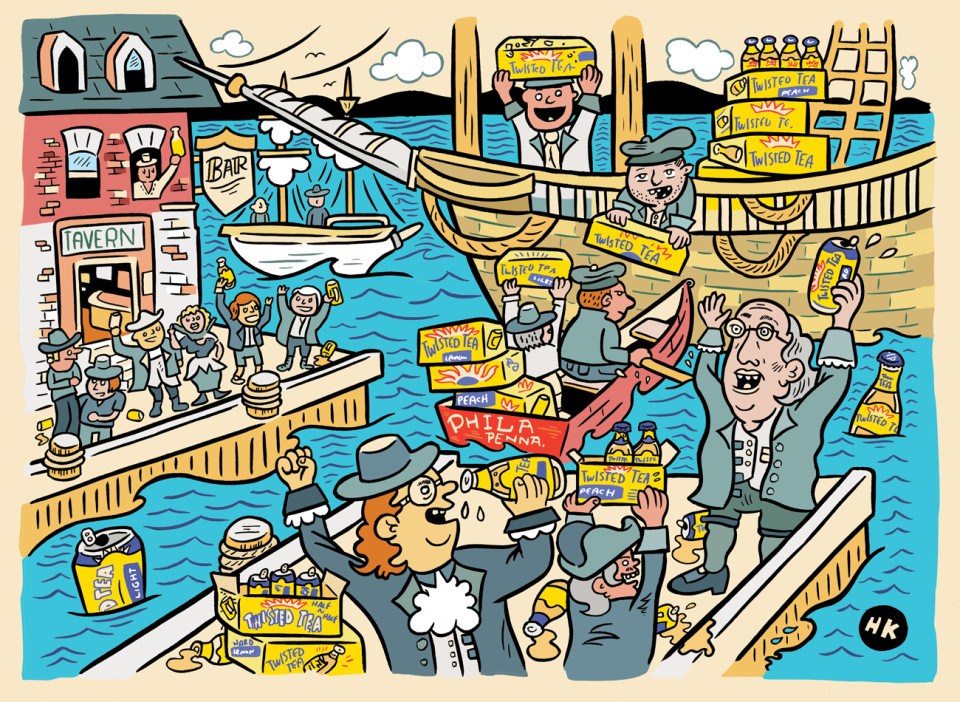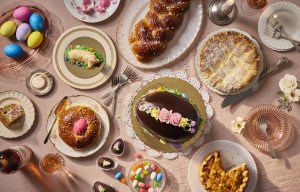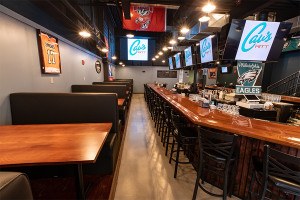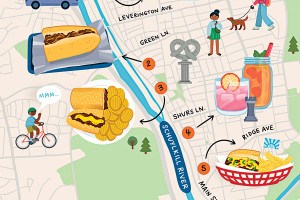How Philadelphia Became Obsessed With Twisted Tea
“It just ran like wildfire.” The never-before-told story of the boozy tea’s meteoric rise.

How did Twisted Tea become a Philly thing? / Illustration by Hawk Krall
Andrew Payne knew his first leg tattoo would need to be special.
His left arm and shoulder were already filled by the city skyline, with the Phillies, Flyers and Sixers logos dancing in the clouds above City Hall. He had another one of his daughter in a Joel Embiid jersey. And one with the cartoon character Arnold Shortman from Hey Arnold donning an Allen Iverson shirt.
So when he decided to get a new tattoo, he started scrolling through the mental photo album of his life. He recalled sitting on the kitchen floor with his fiancée, listening to music as they each worked their way through a 12-pack of Twisted Tea. He remembered “Teas-day”-night parties in his mom’s basement. Then, as if by divine intervention, he glimpsed a crushed Twisted Tea can on the ground and knew he’d found the perfect tattoo.
“I was just thinking about, like, all the good memories in my life, and a lot of them, I was drinking Twisted Tea,” says Payne. “So I was like, ‘This works perfect.’”
So now his upper left thigh bears a permanent reminder of his love of Twisted Tea — well, technically, Twisted Tea Light. Inky black, with just a hint of sweetness.
Twisted Tea, for the uninitiated, is a malt-based hard tea produced by the Boston Beer Company. It’s sweet — lip-smackingly so. Detractors will say it tastes like a bottle of Lipton Brisk that was left in the sun for a few months and started to ferment. (I won’t say that, publicly, for reasons that the rest of this story should make clear. I have a family to protect.) Since its launch in 2000, the brand has also released Twisted Tea Light, Twisted Tea Half and Half (essentially a spiked Arnold Palmer), and a variety of fruit-flavored versions. And it is inexplicably, confoundingly beloved in the City of Philadelphia.
It can be hard to explain Philly’s obsession with Twisted Tea. The Eagles? That makes sense. Hoagies? Easy. Yet I — an explainer by both trade and hobby — have spent the past few months reporting this story, and I still don’t completely understand how a hard tea produced by, of all companies, the Boston Beer Company became so beloved. How this city became the number one market, globally, for Twisted Tea Light. I’ve heard everything from “It just tastes good” to profound, generation-spanning elucidations of its popularity, claims that it’s the sweet five-percent-ABV glue that holds some families together.
On a recent Saturday night, I took a few out-of-town friends to Ray’s Happy Birthday Bar, in East Passyunk. As we nursed a couple or three Citywides, one friend’s eyes trailed a barback pushing a handcart loaded down with five cases of Twisted Tea.
“Is that — ” he began to ask, befuddled.
“A shitload of Twisted Tea?” I responded. “Yes.” He looked like he’d just seen a dog withdraw $40 from an ATM. Yet within the 142 square miles of the City of Philadelphia, watching a man wheel 120 hard iced teas along seems as reasonable as anything else that happens in this (granted, exceptionally unreasonable) city.
It just ran like wildfire.” — Scott Keenan, owner of Keenan’s Irish Pub in North Wildwood
A few years ago, Twisted Tea’s social media team released a heat map of the brand’s most popular markets. There are pleasing green-yellow blobs around the Florida Panhandle (spring breakers), Phoenix (golfers), Los Angeles (small-town girls with dreams of making it in the big city), and a few other spots around the U.S. Above Philadelphia, there’s a splotch so red, it appears a natural disaster has struck the Delaware Valley.
Within that blob, there are Twisted Tea-themed bachelorette parties, Twisted Tea-themed 21st birthday parties, and softball teams donning Twisted Tea uniforms. There are t-shirts emblazoned with the phrase IT’S ALWAYS TEA TIME IN PHILADELPHIA. There’s a man swigging Twisted Tea from a light pole on Broad Street, and a Mummers club with a U-Haul stacked with cases of it trundling down Two Street on New Year’s Day. There’s a mother who asks the bartender at Jimmy’s Timeout Sports Pub in Torresdale to save Twisted Tea caps. Why? On the underside of each cap is a word — any word, really — and she makes magnets out of them and sticks them on the fridge so her kid can learn to build sentences. Twisted Tea: molder of young minds.
If you really zoom into the blob and find yourself at the beer distributor at Two Street and Washington Avenue, straddling the Queen Village/Pennsport line, you’ll find 27 distinct, delicious, and distinctly delicious ways to buy Twisted Tea, ranging from a single 12-ounce can all the way up to the Party Pouch, which encourages the purchaser to “tap it, slap it, pour it, crush it,” then start the process all over again.
“It’s rampant,” says Aron Litostanski, a Bridesburg native and bartender at the Penalty Box in Kensington. “I’m trying to find the words to positively describe the craze. You know, it’s like, it was like Beatlemania. … I mean, Fishtown, Port Richmond, Kensington. You walk up the Delaware and into Tacony, Torresdale, Mayfair, Wiss … it’s all over the place.”
On October 6, 1723, a 17-year-old Bostonian named Benjamin Franklin arrived in Philadelphia. Two hundred and seventy eight years later, in 2001, another Boston émigré arrived on the banks of the Delaware. One changed the course of Philadelphia history forever. The other is on the $100 bill.
In early 2000, Boston Beer Company launched its first hard tea. The company was already contract-brewing tea in its satellite Cincinnati brewery, and thus BoDean’s Twisted Tea was born. The product, in the words of founder Jim Koch in his 2016 memoir, Quench Your Own Thirst, “failed miserably.” Initial reviews were, to put it as magnanimously as possible, unkind.
“It claims it’s ‘handcrafted according to the original Southern recipe,’” Philadelphia Daily News staffer Don Russell wrote in his weekly “Joe Sixpack” column, “which I would believe if the plantation kitchen pantry was stocked with aspartame and chalk.”
Boston Beer didn’t properly market the drink, Koch admitted, and it didn’t help that the brand was sued for infringement by the Wisconsin-based rock band the BoDeans. But from that failure, Koch realized something. Boston Beer mistakenly thought the drink would appeal to upper-income drinkers in their 20s and 30s — the folks who had increasingly reached for hard lemonades and other “alco-pops” in the late ’90s. But in studying the markets where BoDean’s had succeeded, the company saw that adopters were actually quite the opposite: blue-collar workers, “craftsmen who worked with their hands and had real skills — construction workers, cable TV repairmen, telephone linemen, plumbers, electricians,” Koch wrote in his memoir.
With that in mind, the company dropped BoDean’s from the name and relaunched in 2001 as just Twisted Tea. And whether by choice or by fate, Boston Beer headed where everybody goes in the summer: down the Shore.
It was the summer of 2003, and North Wildwood’s Keenan’s Irish Pub was gearing up for another year of no-shower-happy-hours. The bar’s new pitch was to-the-point: “Come Get Twisted at Keenan’s.”
The price point for Twisted Tea was lower than that for any beer they were selling, says Keenan’s owner and Grays Ferry native Scott Keenan, meaning he could sling Teas for two bucks and still turn a decent profit. Combine the price with the drink’s lack of carbonation — if you’re reading this and have somehow never been down the Shore in your early 20s, that translates into “dangerously drinkable” — and Twisted Tea was primed to explode.
“It just ran like wildfire,” Keenan recalls. The numbers were eye-watering: Every week that summer, he’d sell between 350 and 500 cases of Twisted Tea. Reread that sentence, then do the math. Every week, one bar in North Wildwood was slinging between 8,400 and 12,000 bottles of Twisted Tea, outselling everything but Miller Lite. Within three years, Keenan says, his bar was the number one on-premises seller of Twisted Tea in the country.
The phenomenon proved Koch’s instincts right — plumbers, steamfitters, longshoremen, and IBEW ticket-holders were all drinking it up. If you’ve ever been to the Wildwoods in the summer and you grew up in Northeast Philly or Pennsport, one thing is clear: You’re seeing the same folks. (A source once told me, lovingly, that people from Pennsport know how to drive two places: “to Wildwood and back.”) So it makes sense that once Twisted Tea popped off in Wildwood, it would migrate back to the neighborhoods that hug the Delaware in Philly. Keenan doesn’t take all the credit. “We don’t know if it was the chicken or the egg,” he says, meaning it’s impossible to tell whether the drink got popular in Northeast Philly first, which drew Twisted drinkers to Keenan’s, or if sun-kissed Keenan’s drinkers brought it back to Northeast Philly after Labor Day. Personally I’m partial to the Keenan’s-to-Philly migration theory, mostly for seasonal reasons but also because I had that hypothesis before I spoke to Keenan, and I like that he agrees with me.
Soon, Twisted specials were cropping up across Northeast Philly. Longshot Lounge. Joker’s. In 2007, Reales had what could only be described as a reverse happy hour — Twisted Teas were $2 on Fridays, but from 10 p.m. to midnight. Twisted Tea spokesperson Taylor Jette names Santucci’s and Maggie’s Waterfront as key early adopters. (Not much has changed at Maggie’s. Stop by the Torresdale bar today for a Twisted Tea on draft, or a Twisted Sister, a Twisted Tea-based cocktail with a shot of Twisted Tea Sweet Whiskey. You can enjoy it on the patio, under one of the many Twisted Tea umbrellas.)
In the Northeast, fucking everyone drinks Twisted Tea.” — Eric Fink
Then, in 2008, the Phillies made the World Series.
“That’s just where we all started going heavy on the Twisted Teas,” says Eric Fink, native son of the Northeast and namesake of beloved Tacony deli Fink’s Hoagies. It’s also, in this story, when you’ll be introduced to the concept of a Tea Off. Roll the grainy newsreel footage:
It’s the newest, happening-est trend with today’s youth — the Tea Off! Couple fellas line up at a tavern, plop two or three bucks down, and are both handed a delicious, cold Twisted Tea. The first man to finish is the winner. The last man? Well, he better hope he has a few sawbucks in his pocket for the next round!
Harrington’s. Casper’s. Hammerheads. That October, Fink and his friends bounced across the Cottman and Frankford intersection more times than they can remember, celebrating Phils wins and ripping Twisted Tea. The beverage migrated to their softball league — the aptly named League of the Drunks. Score a run? Pull out a Twisted Party Pouch, slap it, and take a pull.
“In the Northeast,” Fink says, “fucking everyone drinks Twisted Tea.”
And not just in the Northeast. It infiltrated Mummers’ clubs in Pennsport and spread like a malty virus across other reaches of South Philly. For decades, the Mummers’ drink of choice, according to longshoreman and Shooting Stars NYB member Mason Smith, had been Jacquin’s blackberry brandy, made just 15 minutes up the road, off Lehigh Avenue. It’s been usurped.
“[Twisted Tea] is just something everyone has in their clubs now,” Smith says. “Which is the reason I’m gonna call that the Mummers’ drink of choice.”
Twisted Tea, which Jette says had always prioritized the Philly market, took notice and soon trained its marketing efforts right on the city. Photos of Philly fans made their way onto Twisted Tea bottles; there were Philly-specific promotions, and the company tapped local acolytes to star in TV commercials. Beer distributors were gifted signs that read WELCOME TO TWISTED TEA COUNTRY to hang on their buildings. On April 1, 2021, Twisted Tea’s Twitter account posted, “Philly, the rumors are true. We’re no longer producing Twisted Tea Lights.” (The April Fool’s joke wasn’t appreciated.) One morning a few years ago, I was walking by Jaxx Taproom in Pennsport when I noticed a woman smoking a cig and wearing a jersey I didn’t recognize. Only upon closer inspection did I realize it was for Twisted Tea.
And remember Andrew Payne’s Twisted Tea tattoo? To reward his lifelong dedication to its malt-based hard tea, the Boston Beer Company sent him a thousand bucks.
This dedication had reverberations outside the city limits, too: Twisted Tea developed a stranglehold on the hard-tea market.
“Depending on what dataset you look at, it’s like around 90 percent market share, which is just crazy dominance,” says Clem Pappas, the CEO of Philly-based Federal Distilling, which produces Stateside vodka. Companies have come at Twisted Tea for years, whether back in the early 2000s or now, with brands like Anheuser-Busch’s Hoop Tea, Monster Energy’s Beast Unleashed, and hard teas from Arizona, Lipton, even Colorado brewing giant New Belgium. In the past few years alone, the malt-based hard-tea market has nearly doubled, climbing from about 80 brands in 2020 to nearly 150 in 2023, according to BevNet magazine. Thus far, none have seriously dented Twisted’s armor.
Within that dominance, though, Pappas saw a sliver of light.
“We kind of saw that opportunity: ‘How can we premium-ize this?’” he says. “There are a lot of parallels between the hard seltzer [market] going from the White Claw sort-of malt-based product to, you know, the spirit-based High Noons and Statesides of the world.”
The first cases of Federal’s Surfside Tea — not a malt-based tea, but rather a vodka/tea combination — trickled out of production in the final days of 2021, with the product launching in earnest in 2022.
“It just went bananas from day one,” Pappas says. “And it was like — we obviously thought it was a good idea. But we had no idea it would take off as fast as it did. We were just immediately, like, flat out of stock. We couldn’t keep up. We thought we had plenty of capacity. And we just kept doubling our orders every month.”
In 2022, the company produced 200,000 cases. In 2023, that shot up to 1.3 million. This year, production is expected to hit between four million and five million cases. Last year, Surfside four-packs were the second-most-sold Pennsylvania-made product in state stores, behind only Stateside vodka. The drink will soon be available in all 50 states, plus internationally.
Pappas credits a lot of the success — beyond the quality of the product, of course — to the ready-to-drink (RTD) craze that has swamped the spirits world since the beginning of the pandemic. It involves two steps: Crack a can, and drink. He also has a more unusual theory: that people in Philly just love iced tea — Wawa, Turkey Hill, Arctic Splash, whatever. We’re just a tea town. He doesn’t view Twisted Tea as his competitor, though — a sentiment that’s echoed by nearly every other person I spoke to for this story.
People still come in and want that Twisted Tea. And then if you say, ‘Oh, I don’t have it; I have this brand, and it’s similar’? They laugh at you and go, ‘No, it’s not. It’s not the same.’” — Jen Carr, bartender at Jimmy’s Timeout Sports Pub in Torresdale
“Even with the new ones, the Surfsides and all, you thought, ‘Oh, Twisted Tea is gonna get pushed out,’” says Jen Carr, a bartender for the past 17 years at Jimmy’s Timeout Sports Pub in Torresdale. “No. Because there’s still a demand. People still come in and want that Twisted Tea. And then if you say, ‘Oh, I don’t have it; I have this brand, and it’s similar’? They laugh at you and go, ‘No, it’s not. It’s not the same.’ So no, I don’t think Twisted Tea is going anywhere, that’s for sure.”
To illustrate her point, Carr tells a story. Last summer, a rep came in pushing a newer tea brand: Sea Isle Spiked Iced Tea, based down the Shore. As the brand rep promoted the tea to a customer, another man spoke up from the end of the bar. Carr described what ensued as “the Battle of the Teas.” This man, this missionary of malt, not only extolled the virtues of Twisted Tea — “You’ll like this one better,” he predicted — but proceeded to buy the stranger a Twisted Tea to prove his point.
“They swear by it,” Carr says. “Like, you have so much faith: ‘You’ll want this brand. Trust me on it. Just give it a shot.’”
And that’s what makes it so us, right? So Philly. We take the little cast-offs and discards, and we make them our own. Over a century ago, we took last night’s leftover meat and veggies, slapped them into some bread, and — poof — we created the hoagie. Twenty years ago, when no one else wanted it, we welcomed Twisted Tea with open mouths, and now it’s ours.
“It’s just so embedded in the culture,” Aron Litostanski, the Kensington bartender, marvels. “Moms, grandmas, grandfathers, all the way down to teenagers drink this stuff. It’s so openly and like, wildly welcome and preferred by a bunch of people.” He pauses, trying to articulate this all-encompassing affinity. “It’s … it’s insane.”
Published as “The Philadelphia Tea Party” in the July 2024 issue of Philadelphia magazine.


